What are the characteristics of someone competent in the outdoors? One very telling trait is a sincere concern about minimizing impact on the environment and the skills to match that concern. As more and more people flock to the outdoors, the need to have such skills become ever more important. No matter what we do--whether it's mountain biking, car camping, climbing, horse packing or boating--we must do it in a way which does the least damage to the environment. The following is a brief summary of procedures and techniques to keep in mind.
Thanks to Dana Elle, JoLynn Howell, and Peter Joyce for their contributions to the following.
Group Size. The size of the group with you depends on where you are going:
Parks or designated Wilderness Areas. If you are going into a park or a designated wilderness area, keep the party size small. How much is small? Generally, you want to keep the size at eight or under. Less is even better.
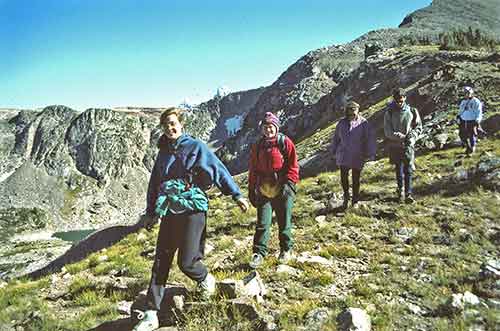
Multiple-use Forest Service Land (Non-wilderness). Larger groups (greater than eight) should use non-wilderness areas or so-called multiple-use lands. Lots of great hiking and exploring can be found on Forest Service or BLM lands that are not designated as wilderness and are the best places to take larger groups.
Pack It In. Pack It Out. We've all heard the mantra and seen the signs at trailheads, but do we really know what it means. Here's a list of some items that people commonly forget about:
Aluminum Foil. Far too many people throw aluminum foil into fires thinking that it will burn. It does, but only partially. There's always small bits and pieces of it left which blow in the wind and are scattered around the camp. If you pack in aluminum foil, pack it out. Remember that many soup and cocoa packages contain aluminum. They also should be carried out.
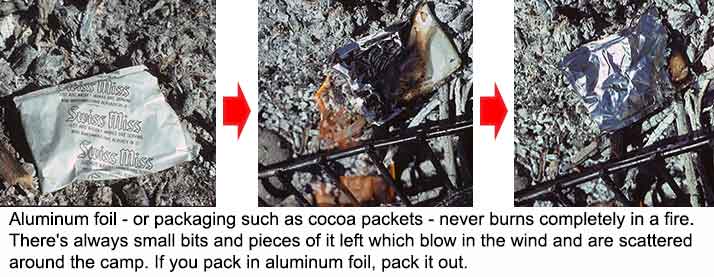
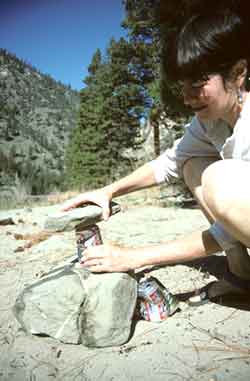 Aluminum Cans. Beer cans and pop cans don't burn. You can throw them in a fire to burn out any residues, but afterwards you should pull them out, smash them and pack them out with the rest of your garbage.
Aluminum Cans. Beer cans and pop cans don't burn. You can throw them in a fire to burn out any residues, but afterwards you should pull them out, smash them and pack them out with the rest of your garbage.
Cigarette Butts. If you smoke, remember two things: First, make sure you do so in a safe location. This is doubly and triply important during the fire season. Many, many fires have been started by careless smoking and improperly disposing cigarette butts. Secondly, when finished putting out the cigarette, place the butt in a baggie and carry it out.
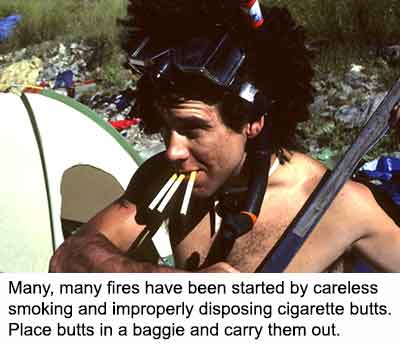
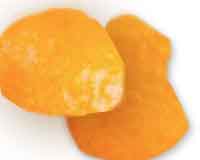 Orange Peels. Orange peels are organic, but they are one organic that lasts a long time. Even in wet climates, orange peels can last for weeks. In some very dry climates they can last for years. They are unsightly and should always be carried out.
Orange Peels. Orange peels are organic, but they are one organic that lasts a long time. Even in wet climates, orange peels can last for weeks. In some very dry climates they can last for years. They are unsightly and should always be carried out.
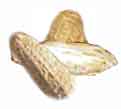 Peanut and eggs shells. If you have a fire, they can be burned, but watch egg shells since often they don't burn completely. Go through the ashes of your fire and carefully pick up any unburned portions. If you don't have a fire, then peanut shells (yes, peanut shells) and eggs shells should be carried out.
Peanut and eggs shells. If you have a fire, they can be burned, but watch egg shells since often they don't burn completely. Go through the ashes of your fire and carefully pick up any unburned portions. If you don't have a fire, then peanut shells (yes, peanut shells) and eggs shells should be carried out.
Other organic waste. As a general rule, all garbage should be carried out, even left over food. That's a particularly important rule if you are camping in a heavily used area. In infrequently used areas, however, the rule can be applied less rigidly. Be careful not to generate left over food, but if you do end up with leftovers, mix 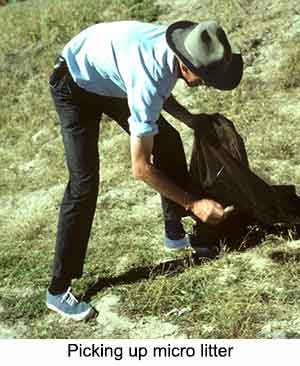 them well with the top organic layers of soils (which aids the composting process) and then bury it.
them well with the top organic layers of soils (which aids the composting process) and then bury it.
Micro litter. Before leaving a campsite, get in the habit of doing one last look for litter including micro litter. Micro litter consists of pieces of candy wrappers, bits of aluminum foil, cigarette butts, etc. A quick litter pick-up is also a great thing to do at boat launching areas, car camping areas and trailheads. It's one of those small, random acts of kindness that you can do for the environment.
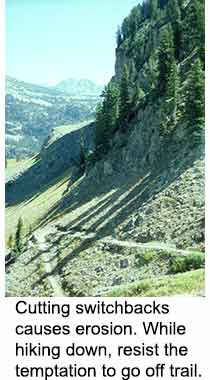 Trails and Cross-country Travel
Trails and Cross-country Travel
Switchbacks. When going down switch backing trails, stay on the trail and resist the temptation to cut the switchback. Cutting switchbacks creates small pathways which divert rain and melting snow and eventually lead to erosion.
Cross-country travel: Foot or horseback. Cross-country travel is fine on foot or horseback - and when traveling cross-country use durable surfaces (snow or rock) whenever possible. To avoid creating a trail, don't hike one behind the other, i.e. don't follow each other's foot steps. By spreading out, impact is minimized.
Cross-country travel: Mountain bikes, trail bikes or four-wheelers. Anything other than off-trail foot or horseback travel is a no-no. Mountain bikes or trail bikes or four-wheelers can leave scars which in some areas may take many years to heal. Bikes and ATV's should always stay on trails.
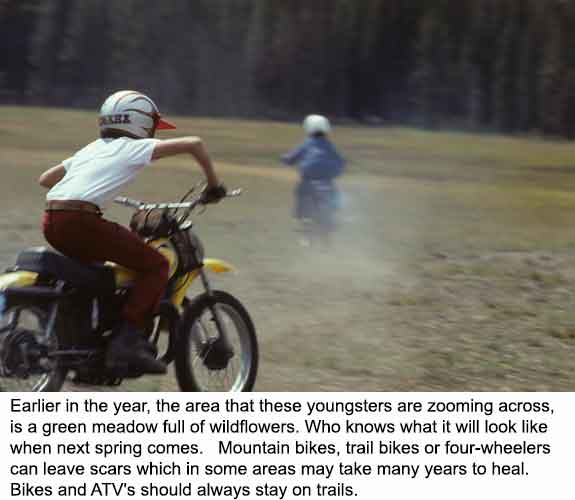
-
For cooking, use a stove for cooking. If you have a fire, use a fire pan. One of the worst things you can do to a river beach is to build a fire without a fire pan. The coals from the fire will stay in the sand for years, ruining the beauty of the beach.
-
Depending on management regulations, you may be directed to do personal washing above the high water mark - or you be may be directed do it in the river. If you are on a wilderness river - such as in Alaska or Canada- and there are no specific regulations, then do personal washing above the high water mark.
-
Again, it may depend on the rules established by the management agency, but the disposing of dish waste water may occur above the high water mark and 200 feet from the river - or you may be asked to dispose of it in the river. If there are no regulations, then dispose it above the high water mark.
-
Clean up the campsite thoroughly.
-
Land management agencies will have specific regulations dealing with human waste. Almost all permit rivers will require some type of toilet system and a way of carrying human waste off the river. If there are no regulations, urinate and dispose of solid human waste above the high water mark and at least 200 feet away from the river.
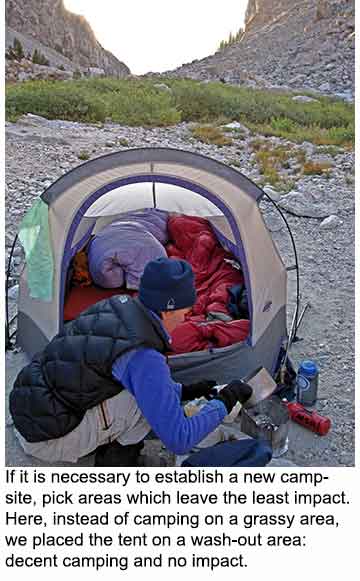 Location. One of the best ways of cutting down widespread damage is to use areas already impacted. In other words, if you have a choice between creating a new camp site and using an existing campsite, use the existing one.
Location. One of the best ways of cutting down widespread damage is to use areas already impacted. In other words, if you have a choice between creating a new camp site and using an existing campsite, use the existing one.
New Campsites. If it is necessary to establish a new campsite, pick a spot at least 200 feet away from streams or lakes. If possible, pick areas which leave the least impact: a forested area with a pine needle covered floor, a sandy beach, the area below the high water mark on rivers, an area naturally free of vegetation, or even flat slab of rock, all of which can be utilized without causing any appreciable damage.
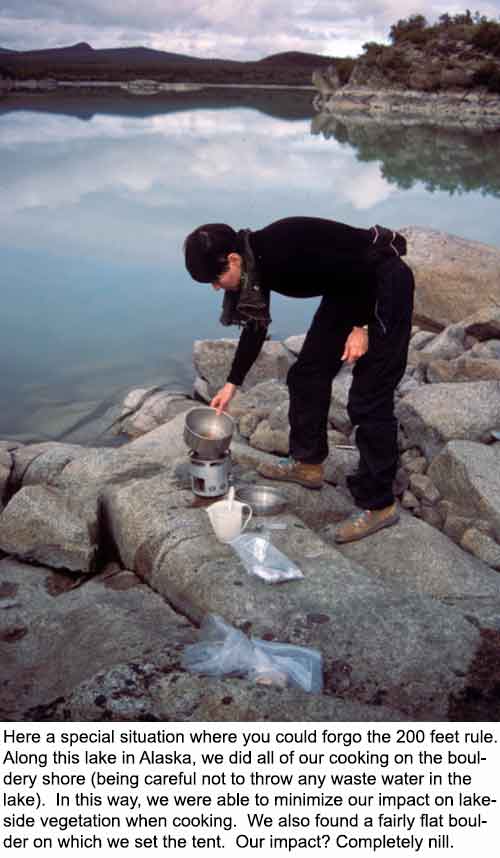
River Running: An Exception to the 200 foot Rule. If you are kayaking, rafting or canoeing, often the best place to camp is below the high water mark on gravel or sand bars. By camping in such areas, you'll have very little impact on riparian vegetation along the river.
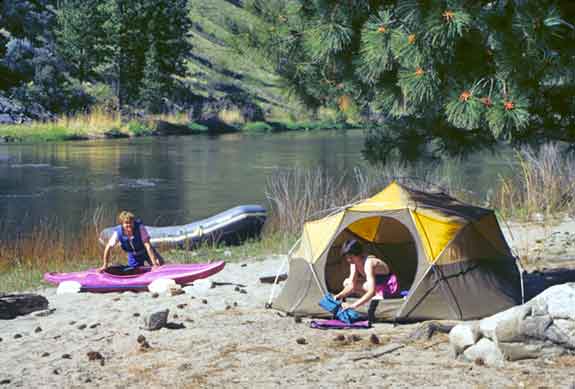
River Trips: Camping below the high water mark, however, this will put you within 200 feet of the river and it's important to remember the following:
Fires. Make sure you know what the rules are before going to any area. Many wilderness areas and park lands require the use of stoves. During fire season, National Forest lands may be closed to open fires.
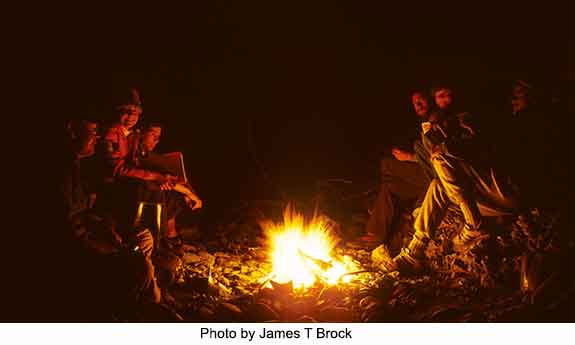
Is a Fire Necessary? If there are no rules against fires, consider whether you really need one. All things considered, it's a lot easier to do your cooking on a stove. They are clean, convenient and cause little impact.
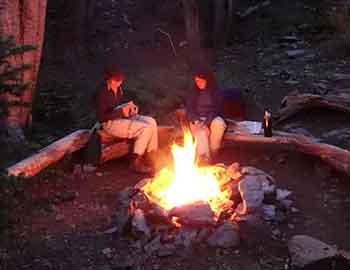 Use Existing Fire Pits. If you decide to make a fire, then the same rule which applies to campsites applies here. Use an area that has already been impacted. If there is an existing fire pit, use it.
Use Existing Fire Pits. If you decide to make a fire, then the same rule which applies to campsites applies here. Use an area that has already been impacted. If there is an existing fire pit, use it.
New Fire Pits. If you must make a new pit, try to find a bare spot where mineral soils are showing. Be extremely careful in forested areas. Remove forest duff (decaying pine needles, bark, leaves and other organics) all the way down to mineral soil. It is extremely important that you remove all the duff; otherwise, you are risking a fire. A small burn can get started in duff and burn very slowly and unnoticed, only to flare up hours or days later. A number of forest fires have actually been started this way.
Use of Rocks. To help keep the camp area free of blackened and sooty rocks, minimize their use, or, better yet, avoid using rocks altogether. Don't build fires against large rocks or boulders, and never build a fire against the base of a cliff. It takes decades of weathering before unsightly soot washes off of a rock face.
Use Small Fuel. Use small diameter sticks to feed the fire. They will burn easier and the smaller ashes they create are easier to clean up later.
Removing Gross Fire Pits. Some times you'll come upon fires built in inappropriate areas: the middle of beautiful meadow, a scenic overlook, or on a beach beside mountain lake. Usually, it's best to leave pre-existing fire pits, but if you find a fire pit built in the wrong place, take time to clean it up: throw away the rocks making up the fire ring, remove the ashes, and do your best to make the area look natural again.
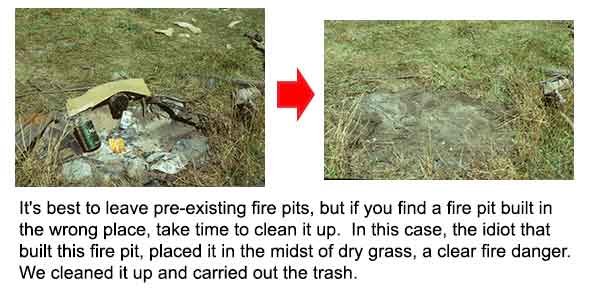
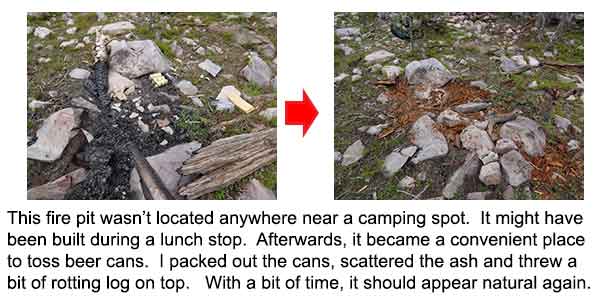
Cleaning up Existing Fire Pits. In most cases, you'll want to leave frequently used fire pits. Some, however, are particularly unsightly: those with huge, blackened boulders filled with glass, melted beer cans and balls of aluminum foil. If they look like this and you have time, stop and clean it up by removing the larger boulders, ridding the site of excess ashes and packing out any garbage. It's just another one of those random acts of kindness you can do for the outdoor environment.
A Important Note About Cleaning Up Fire Pits. When cleaning up a fire pit, always make sure the ashes are out cold. If there's any doubt, don't destroy the fire pit. It's far better to leave an unsightly pit than start a far more damaging forest fire.
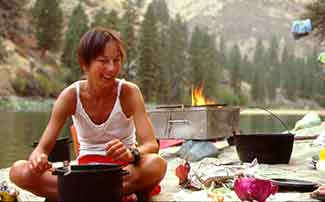 Use Fire Pans on Rivers or Lakes. To help minimize impact along rivers, many river management agencies require the use of fire pans. The pan contains all the ashes, so nothing is spilled on the ground. Once the fire is out, the ashes can be packed out.
Use Fire Pans on Rivers or Lakes. To help minimize impact along rivers, many river management agencies require the use of fire pans. The pan contains all the ashes, so nothing is spilled on the ground. Once the fire is out, the ashes can be packed out.
Fire pans are particularly nice on beaches. No coals and soot gets in the sand and the beach stays pristine and attractive to those who follow you. If you raft, canoe, car camp or horsepack, consider the use of fire pan. It enables you to have fires, yet eliminates all the impact that fires can create in a campsite.
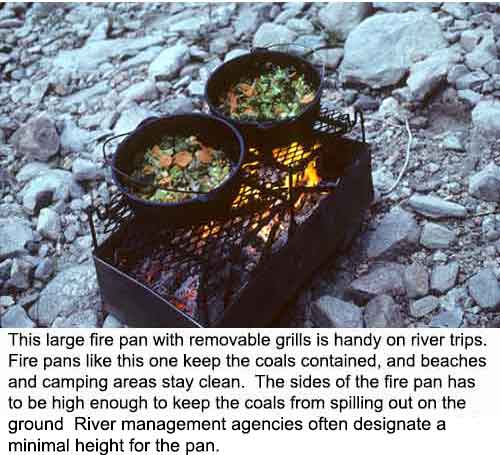
General Washing. Unless the management agency requires otherwise, never put soap, dish water, food scraps or garbage in water sources. (Note that in some desert areas--such as along the Grand Canyon of the Colorado--you may be required to deposit dish water in the river. In any pristine area, however, this is not acceptable.)
Small Groups. Dish washing in small groups is usually done individually. The process is easy: place some water (hot water left over after cooking is the best) in the dirty dish or cup, clean it with your fingers and a little sand, swish it around and throw it up on the bank. Usually soap is not necessary, but if you use soap, use it sparingly and throw the waste water on the bank, not into a water source.
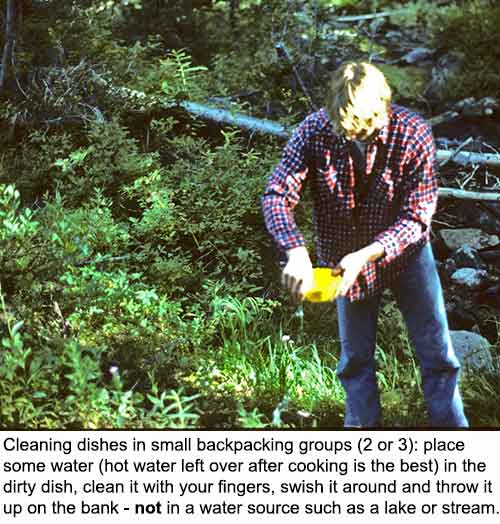
Larger Groups. Large groups may establish a central washing area. Make sure the wash area is set up away from the water source. Using three buckets (soap, rinse and rinse with Chlorox) will greatly reduce the chances that members of the group will sick from intestinal problems. When finished pour the dish water through a screen into a sump hole. The filtered food particles caught by the screen should be packed out with the garbage.
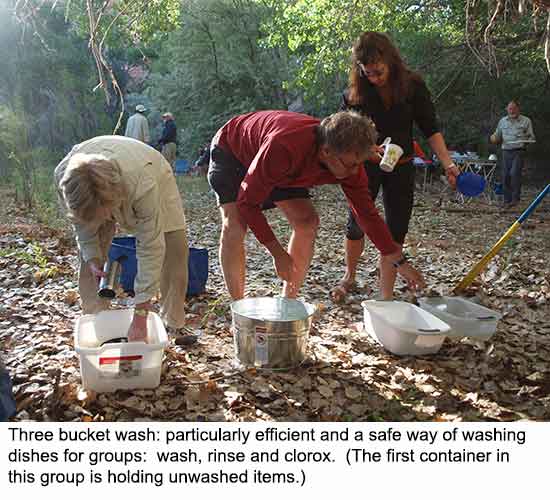
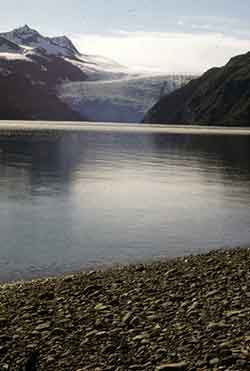 Doing Dishes on Sea Kayaking Trips. The ocean is an incredibly effective decomposer of organics. Left over food can be placed or shallowly buried in the intertidal zone. Once the water comes up, the ocean will do the rest.
Doing Dishes on Sea Kayaking Trips. The ocean is an incredibly effective decomposer of organics. Left over food can be placed or shallowly buried in the intertidal zone. Once the water comes up, the ocean will do the rest.
Personal Washing. If there are no specific management guidelines otherwise, personal washing should be done at least 200 feet from any water sources. Put some water in a cooking pot and do a sponge bath (illustrated below).
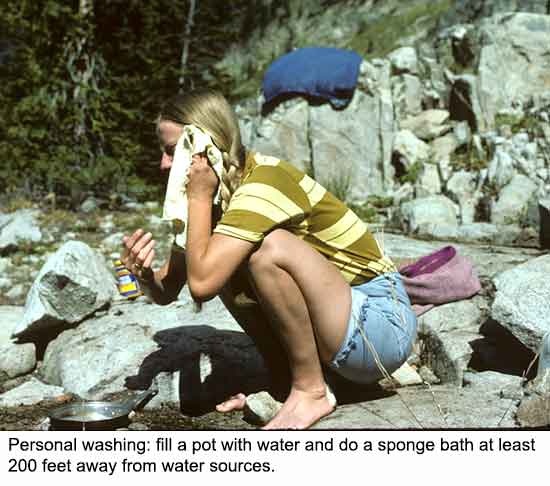
Small groups. Small groups should use the cat hole method for human waste disposal: using your heel, a flat rock or small scoop, make a shallow hole in the forest duff. Before doing so, be sure that you are over 200 feet from water sources. Once finished, mix the top organic layer of soil thoroughly with the feces (which greatly aids the decomposition process) and bury.
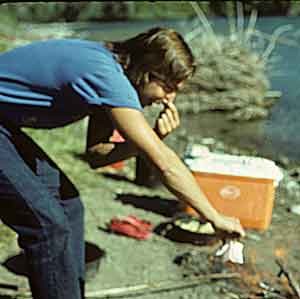 Toilet paper. If you have a fire burning, throw the toilet paper into the fire. Some people recommend burning toilet paper on site, but I emphatically disagree. Burn it on site only during very wet weather or in the winter. Never, never burn toilet paper during dry conditions. A number of large forest fires have started simply by people burning their toilet paper. The best way of dealing with used toilet paper is to unravel it and mix it with the feces and organic soil. Then Bury it. Toilet paper, after all, is a wood product and will eventually decompose.
Toilet paper. If you have a fire burning, throw the toilet paper into the fire. Some people recommend burning toilet paper on site, but I emphatically disagree. Burn it on site only during very wet weather or in the winter. Never, never burn toilet paper during dry conditions. A number of large forest fires have started simply by people burning their toilet paper. The best way of dealing with used toilet paper is to unravel it and mix it with the feces and organic soil. Then Bury it. Toilet paper, after all, is a wood product and will eventually decompose.
Desert Environments. Very little decomposition takes place in the desert, and what does take place is greatly assisted by the sun. Thus it's important to not bury human waste very deeply. For human waste disposal, find a place out of the way, flatten out the feces with a stick or rock, and bury them under a thin layer of soil. Toilet paper should be burned (but only if very safe) or placed in a plastic bag and carried out.
Sea Kayaking. In coastal areas, scoop out a shallow hole in the intertidal zone. Once the water comes up, the ocean will do the rest.
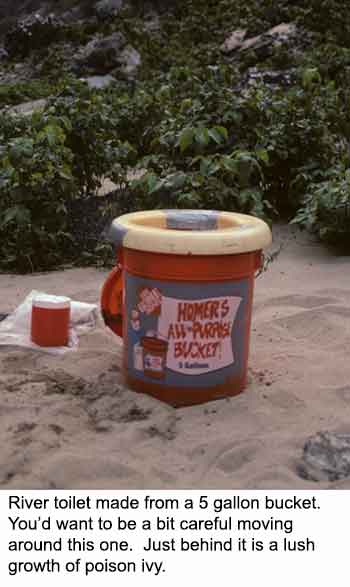 Rivers. Because the same campsites are used day after day all summer long, many agencies which manage western rivers require that you take along portable toilets and carry out all of your human waste. Check the regulations before starting your trip.
Rivers. Because the same campsites are used day after day all summer long, many agencies which manage western rivers require that you take along portable toilets and carry out all of your human waste. Check the regulations before starting your trip.
Larger Groups: Latrines. Use a latrine with larger groups (which means you won't be in a wilderness area). A proper latrine should be constructed so it is wider than it is deep: about foot in depth and two feet wide. After each person uses it, the feces should be mixed with organic soil from the very top of the hole. Before you leave, bury everything.
Tampons. No matter what style of disposing of human waste, never bury tampons. Always carry them out. Triple bag them and use a broken tea bag or crushed aspirin to cut back odor. If you have a fire, they can be burned, but after burning them, pull out the charred remains, bag it and carry it out.
Locking Brakes. Besides staying on trails, mountain bikers can help minimize impact by not locking tires on downhill stretches. A locked tire creates a groove in the trail which leaves it vulnerable for erosion.
Muddy Season. During the muddy season, stick to the roads and away from single tracks. If, while riding on a single track trail, you reach a muddy area, walk around it instead of trying to ride around the side which causes small mud holes to become larger and larger.
Climbing Considerations. Here are a few special things that you should take in consideration when climbing:
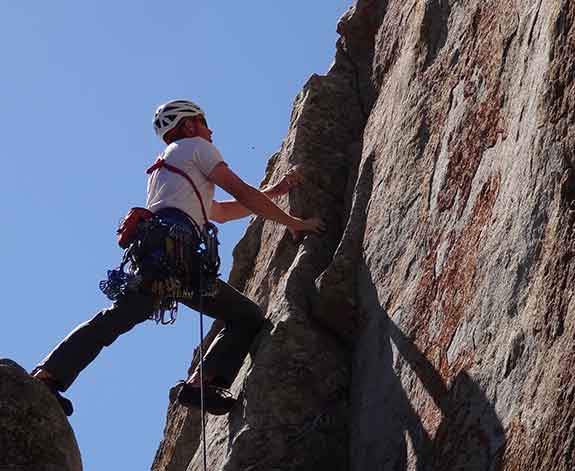
-
If you use tape, be sure to put any pieces that you tear off in your pockets.
-
Stay off of climbs where birds are nesting until later in the summer after the birds have left.
-
When using a tree for a rappel anchor, don't wrap the rope around the tree. It will damage the bark. Instead, put a sling around the tree and put the rope through the sling.
-
Leave rock as you find it. Don't try to modify it by chiseling in a new hold.
-
Always use care and discretion when placing bolts. When leaving fixed anchors, try to disguise them by using materials the same color as the rocks. Whenever possible, however, use retrievable protection, cams, hexs, stoppers and natural anchors (tree, rock horns, etc.).
-
Don't climb on or near areas of cultural or historical significance.
-
When using chalk, use a chalk ball with a matching earth tone color.
Pack Animal Considerations. If you use pack animals, there's much that can be done to minimize impact. Here's a few suggestions:
-
Before leaving on a trip, check to see if Weed-Seed-Free Feed is required. Even if it's isn't required, using it helps prevent the spread of noxious weeds. Make sure that your animals are clean and do not carry weed seeds on their coats.
-
Try not to create new camps, rather use already established horse camps.
-
Keep pack animals at least 200 feet from water sources and camping areas.
-
To reduce trampling, hobble stock rather than picketing. If you must use picket ropes and pins, move horses frequently to eliminate damage to vegetation.
-
Be careful about tying horses to trees which if left for a period of time will creates an area of high impact. If necessary to tie to a tree, use an old cinch around the tree and pass a rope through the D-rings. This helps eliminate damage to the bark of the tree.
-
Don't hammer nails in trees or dig trenches around tent sites.
-
When leaving, clean up the camp. Remove excess hay. Scatter manure piles and fill in areas that have been dug up.
For more information, an excellent source is Dan Aadland's Treading Lightly with Pack Animals: A Guide to Low-impact Travel in the Backcountry, Mountain Press, Missoula, 1993 ISBN # 0-87842-297-8
General Information
Take pictures, but not flowers, rocks, or artifacts. Leave the natural beauty for others to appreciate. Don't pick flowers, cut down trees, remove bird nests or disturb wildlife. Don't carve on trees or dig trenches around tents. Leave the area in better condition than you found it.
More information on Minimal Impact
How to Shit in the Woods by Kathleen Meyer, Ten Speed Press, 1989.
Leave No Trace. Information and materials. PO Box 997, Boulder, CO 80305. Phone number: 800-332-4100.
Soft Paths by Bruce Hampton and David Cole, Stackpole Books, 1988.
The Basic Essentials Of Minimizing Impact on the Wilderness by Michael Hodgson, ICS Books, 1991.
Treadling Lightly with Pack Animals: A Guide to Low-impact Travel in the Backcountry by Dan Aadland, Mountain Press, 1993
Soft Paths. (Video, 31 minutes) By the National Outdoor Leadership School (288 Main Street, Lander, WY 82520-3128).
